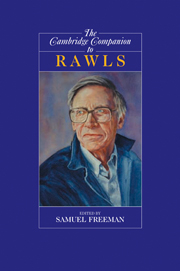Book contents
- Frontmatter
- Introduction
- 1 Rawls and Liberalism
- 2 For a Democratic Society
- 3 Rawls on Justification
- 4 Rawls on the Relationship between Liberalism and Democracy
- 5 Difference Principles
- 6 Democratic Equality
- 7 Congruence and the Good of Justice
- 8 On Rawls and Political Liberalism
- 9 Constructivism in Rawls and Kant
- 10 Public Reason
- 11 Rawls on Constitutionalism and Constitutional Law
- 12 Rawls and Utilitarianism
- 13 Rawls and Communitarianism
- 14 Rawls and Feminism
- Bibliography
- Index
10 - Public Reason
Published online by Cambridge University Press: 28 May 2006
- Frontmatter
- Introduction
- 1 Rawls and Liberalism
- 2 For a Democratic Society
- 3 Rawls on Justification
- 4 Rawls on the Relationship between Liberalism and Democracy
- 5 Difference Principles
- 6 Democratic Equality
- 7 Congruence and the Good of Justice
- 8 On Rawls and Political Liberalism
- 9 Constructivism in Rawls and Kant
- 10 Public Reason
- 11 Rawls on Constitutionalism and Constitutional Law
- 12 Rawls and Utilitarianism
- 13 Rawls and Communitarianism
- 14 Rawls and Feminism
- Bibliography
- Index
Summary
For John Rawls, public reason is not one political value among others. It envelops all the different elements that make up the ideal of a constitutional democracy, for it governs “the political relation” in which we ought to stand to one another as citizens (CP, p. 574). Public reason involves more than just the idea that the principles of political association should be an object of public knowledge. Its concern is the very basis of our collectively binding decisions. We honor public reason when we bring our own reason into accord with the reason of others, espousing a common point of view for settling the terms of our political life. The conception of justice by which we live is then a conception we endorse, not for the different reasons we may each discover, and not simply for reasons we happen to share, but instead for reasons that count for us because we can affirm them together. This spirit of reciprocity is the foundation of a democratic society.
Public reason has emerged as an explicit theme in Rawls’s writings only after A Theory of Justice with his turn to “political liberalism” and the pursuit of a common ground on which people can stand despite their deep ethical and religious differences. But the concept itself has always been at the heart of his philosophy. It runs through his first book in the guise of the idea of publicity, playing an indispensable part in the theory of justice as fairness.
- Type
- Chapter
- Information
- The Cambridge Companion to Rawls , pp. 368 - 393Publisher: Cambridge University PressPrint publication year: 2002
- 35
- Cited by



